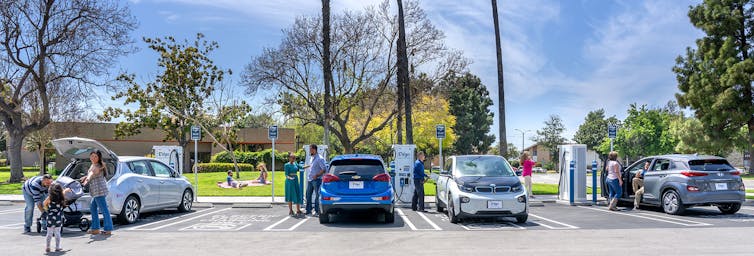By Naoko Ellis, University of British Columbia and Derek Gladwin, University of British Columbia | –
Despite learning that climate change is hitting the planet faster than scientists predicted, society has been slow to decrease the use of fossil fuels and reduce greenhouse gas emissions.
For a consumer, for instance, making the switch to an electric vehicle (EV) is a difficult decision. There are many interconnected factors to consider, including the cost, what model to choose, whether there’s adequate charging infrastructure, if the timing is right and what its environmental impact might be.
Making the decision to buy an EV shows how climate change and its solutions are complex systems. One tool that can help consumers navigate this complexity is an approach called systemic storytelling. According to researchers Elise Talgorn and Monique Hendricks, systemic stories offer “parallel storylines that intersect to represent an interpretation of a system.”
As professors focused on environmental education, we use storytelling as a tool to communicate the complexity of the climate emergency in university courses and international workshops. Ultimately, systemic stories help people comprehend complex issues and create accessible frameworks to make decisions and act.
The world is complex
Society continually sees the difficulty of solving complex problems, whether it is an end to global conflicts, pandemics or climate change. Complexity science allows people to understand the relationships among ever-changing interconnected elements through what is called systems change.
In an article in the Stanford Social Innovation Review, Ella Saltmarshe, whose work lies at the intersection of culture and systems change, writes: “The work of systems change involves seeing systemically — looking at the elements, interconnections, and wider purposes of systems — and acting systemically.” She then affirms how collective stories play a vital role in illustrating both seeing and acting when it comes to the complex systems in which we live.
Complexity science: an emerging alternative paradigm to our scientific inquiry

In the book Getting to Maybe: How the World is Changed, the authors similarly elaborate on how complexity arises from the interdependence of various parts and how they interact. In other words, a person can’t be understood simply by parts of their bodies, but as a cohesive whole.
In a complex world, not every phenomenon can be explained through a linear, cause-and-effect approach. For example, a small change may cause large effects, such as one slow-moving car creating a traffic jam.
To thrive in a complex world, one must adopt a non-linear approach that considers seemingly unrelated, yet interconnected, elements. Rather than being fixated on immediate solutions, focusing on the relationships between the elements to identify patterns, intersections or parallels can help us make meaning and reach decisions.
Storytelling through complexity
People use language, imagination and creativity to conceptualize problems and act. For example, some coastal communities are deciding how to adapt to sea level rise through visualization tools.
The researchers behind the development of the Communications Handbook for IPCC Authors show how human stories are fundamental to communicating about climate change. Because people respond to stories more than data, they argue, communicating complexity change in narrative formats provides a universal structure that connects a broad range of experiences.
Stories allow people to select and share the most relevant parts of the whole system, interpret their actions or roles, create meaning, communicate uncertainties and provide relatable trajectories into the future.
Stories can explain complexity because they provide the space for diverse and, at times, opposing points of view. Collective storytelling can also change cultural and mythic narratives to bring communities together and guide a complex system to change.
The case of EVs
EVs will reduce greenhouse gas emissions from transportation globally, with analysts estimating 200 million EVs on the road by 2030. In Canada, the federal government’s 2022 budget promised a $1.7 billion investment to expand the incentives program for zero-emission vehicles and encourage a switch to EVs.
The Big Shift: Is Canada ready for the EV revolution?

While an EV revolution may be upon us, governments and companies are still learning effective ways of communicating the benefits of transitioning to an EV. Systemic storytelling can assist in understanding the system more holistically.
Consider EV batteries. A mining company extracts the required metals. Batteries are manufactured internationally. Batteries need to be charged. Batteries must be recycled when they reach the end of their working life.
Each step in the battery life has a real-world human story that parallels other stories in the system of relationships.
For instance, a mining engineer may tell you how they test a rig to reduce greenhouse gas emissions. Scientists may reveal how their innovation could lead to widespread recycling of EV batteries. A family looking into buying an EV might not be able to afford a model that meets their needs.
Real-world stories describe the system we live in. Using EVs as an example, connecting systemic stories reveal a holistic view of the system (consumers, industry, politicians, etc.). These stories not only show the system we live in, but also function as an integral part of the climate emergency.
Listening to these connecting stories from a variety of perspectives ultimately empowers us to make informed decisions that collectively make change.![]()
Naoko Ellis, Professor in Chemical Engineering, University of British Columbia and Derek Gladwin, Assistant Professor, Language & Literacy Education, and Wall Fellow, University of British Columbia
This article is republished from The Conversation under a Creative Commons license. Read the original article.
Featured Image: 
(EVgo Network/flickr), CC BY-NC



 © 2026 All Rights Reserved
© 2026 All Rights Reserved